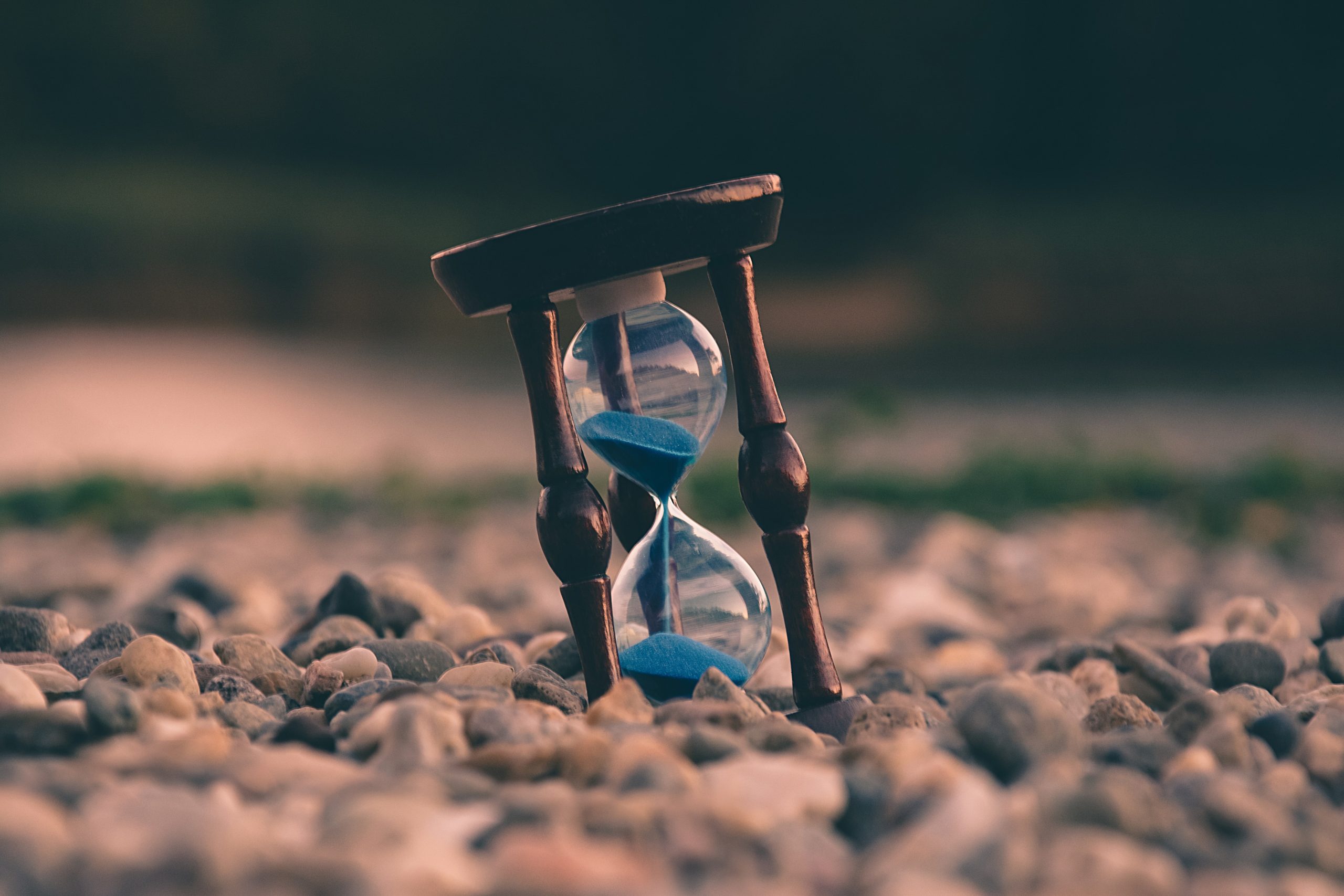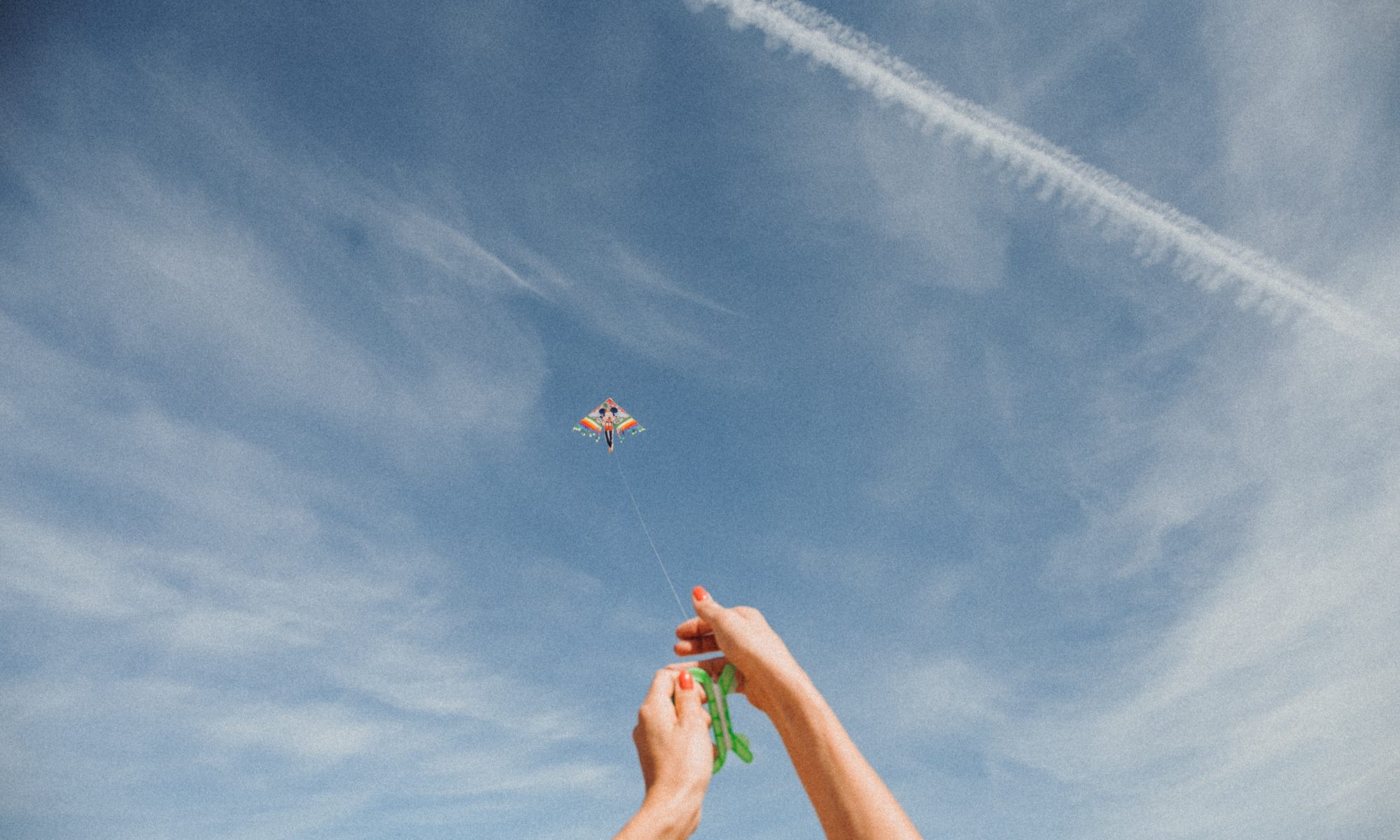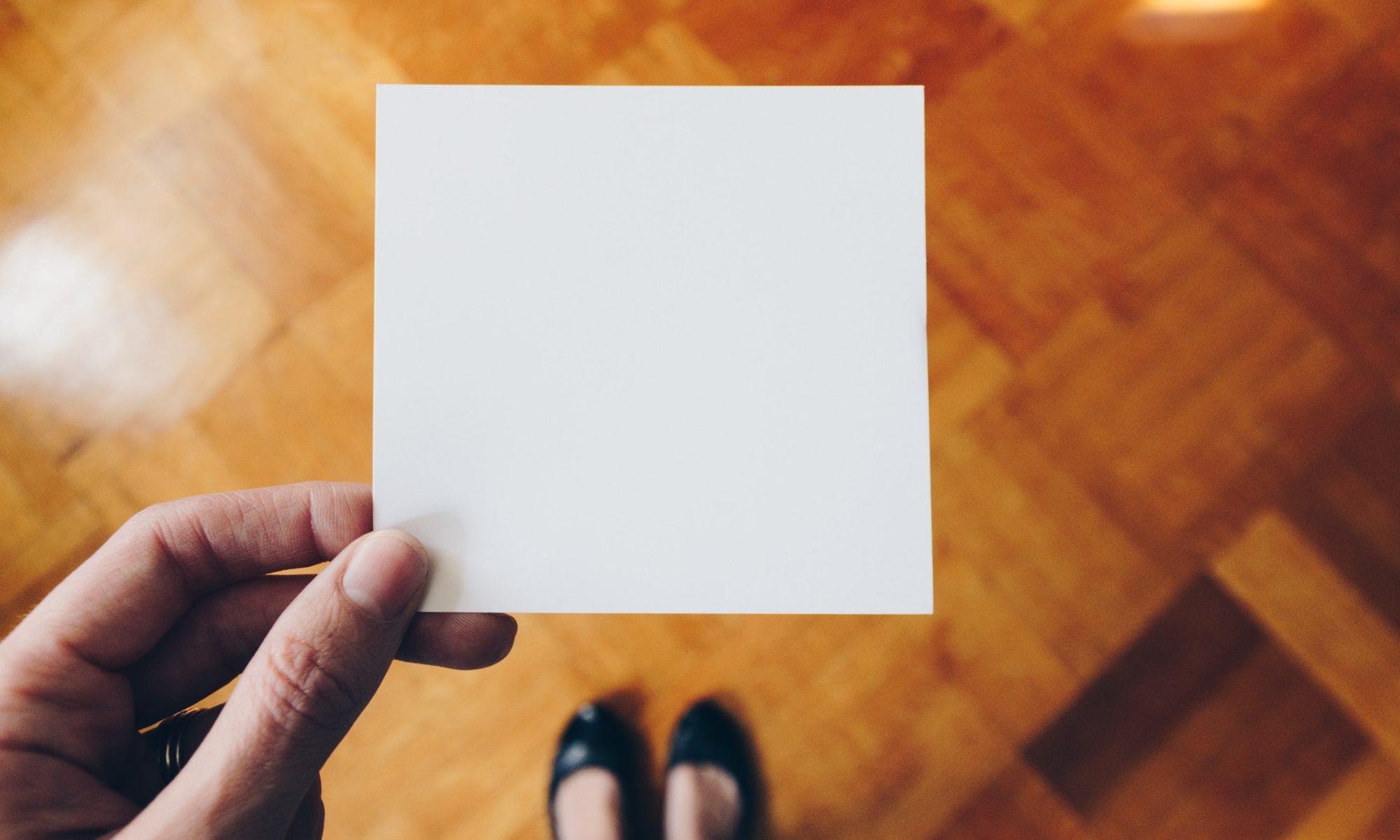-Time management, time blocking and the death of my eight-hour workday
If you have followed these rambles for a while now, you will know that I am someone who:
- Gets distracted easily
- Struggles with a lot of things happening at once
- Am super motivated every Monday and lose that spark by Tuesday afternoon
- Can no longer work crazy hours because I apparently have a life, and because, honestly, I don’t want to
The Engineer and I had a discussion last night about how working from home (or living at work) has changed our mindset about the eight-hour workday. The difference is interesting. The Engineer enjoys the freedom of being able to move things around, get something done after dinner, work on the weekend. I on the other hand really struggle with feeling guilty towards my family because I am working and then feeling guilty about my work because I am … doing the washing. So while my time management is focused on the fact that I have limited time to do everything, he is focused on the fact that things can fit into a little box. I have also learnt in recent times that just because you work crazy hours, does not actually mean that you are more productive.
It is in fact, also bad for you. This study in the Washington Post states that “A growing number of studies are examining the link between long hours, health problems and productivity. And what they’re finding isn’t pretty.”
The Economist wrote a piece on how we should “get a life”.
Some even state that boasting about the long hours is a sign of failure.
We would never have worked from home had it not been for Lockdown2020. We would definitely not have had discussions about what mop to buy or fought about unpacking the dishwasher because we would never have been here during the day for these things to be on our radar. But here we are, a publisher armed with sticky notes and planners and an Engineer who has just been introduced to the term time blocking.
Type “time blocking” into Google and you will find an abundance of information. Type it into Pinterest, and you will find templates and designs and various individuals stating that it has changed their life. Over the past weekend, the Engineer bounced into the living room, armed with his phone, showing me that the app that his team uses at work has a time blocking functionality and how fantastic that is. I nodded and smiled but felt a little chuffed that he has a little understanding of my planning brain.
At the beginning of August 2020, I challenged myself to try it. I have read a lot about it and realised that the principle behind it is something that fits into my sticky noted, colour-coded way of thinking. At the time I also knew that anything that could give me more productivity during my day would be an improvement because this ship was sinking, and fast.
So I needed a plan. I have already been bullet journaling for a little more than a year, and I feel that I have worked out a little system there that works for me. Among other things I have learnt that I am without any doubt a paper-based creature and that I am okay with that.
Since I started with my planner, I have figured out that my day needs a double-page spread. So an ordinary day would look like this:
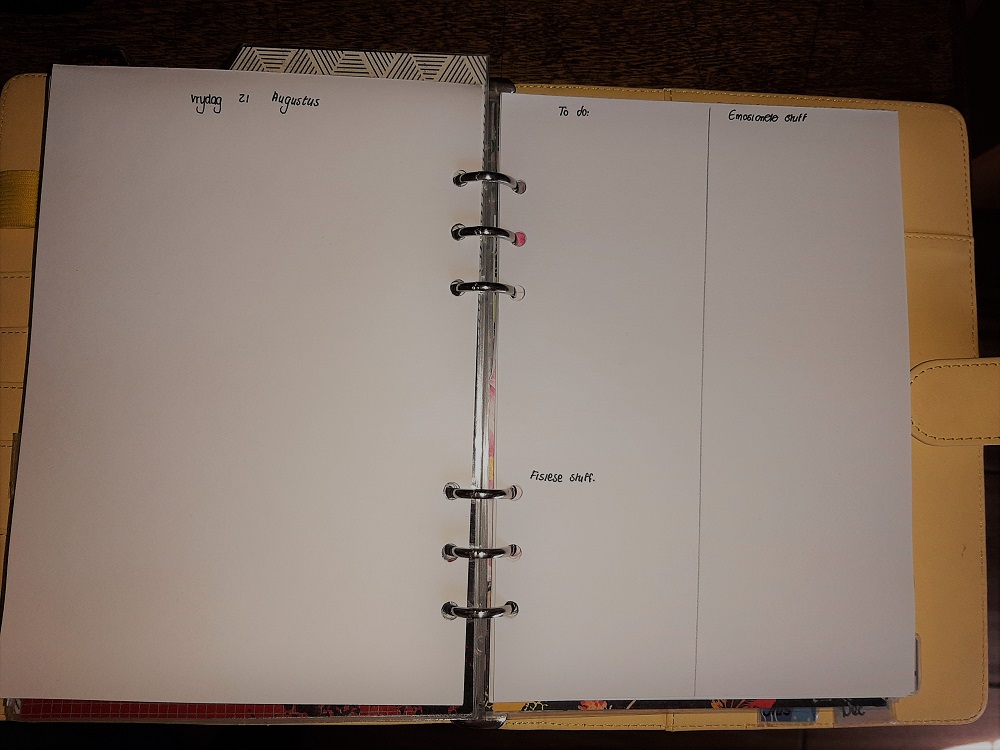
Boss lady worker ant things are on the left. On the right is the “home stuff”. So it has a personal to-do list, a space for physical things (I am a bit of a symptom checker because I believe that physical things trigger emotional things and vice versa). On the other half of that page is a column for all my annoyances, things that I love, things that I hate, little plans, general rambles (note how I limit my mind to only half a page!). I think that people who seriously journal will understand this section.
In short, the above method is what I have been using to get myself through the day. There is a lot of motivation in being able to colour a little box when something has been done.
Towards the end of March I realised I relied a lot on my team’s work to be reminded of things. I thrive in an office environment because I can slot my tasks in with the others, but suddenly in isolation, I realised that I was forgetting things. Again I turned to my planner for assistance.
Added to the planner a weekly divider, that had tasks arranged by project and also a daily divider on which I could stick important things of that day. Daily work pages were then used to actually write down those things that were accomplished, yes, so that I can colour a box, but also so that I did not lose my mind.
Pretty soon, however, these would be updated on a Friday and then simply be moved from day to day with very little progress. So my action plan needed to be revised. I was introduced to the concept of time blocking a while back but thought it to be … well… a little overkill. I then looked at my small handwriting and my colour-coded sticky notes and realised that overkill would suit me just fine.
I started with scheduling the first hour of my workday, every day, to go through the email that has come in and jotted down my tasks. I then also go through every project (in our case mostly journal titles) and write down what needs to happen with those on that particular day). This list appears in no particular order on the work page of my planner. And then, yes, I schedule appointments with myself in Outlook. If the appointment has been set, the task gets a little block next to it in my planner and when it is finished I can colour that block. Currently, the day is broken up in 30-minute slots from 8 am to 4 pm and every half an hour is accounted for. If I finish something in 5 minutes I can go on to the next task. It does however really assist me in what I need to be focused on in that 30 minutes. I am also not distracted by other things that need to happen that day, because I know that I will be getting to it.
This has now worked fairly well for about two weeks. I have however realised today, that I am reinventing the process every morning. So in came the next phase. I have now created a simple laminated sheet. I can stick my tasks on there and move them around if things change… because they always do.
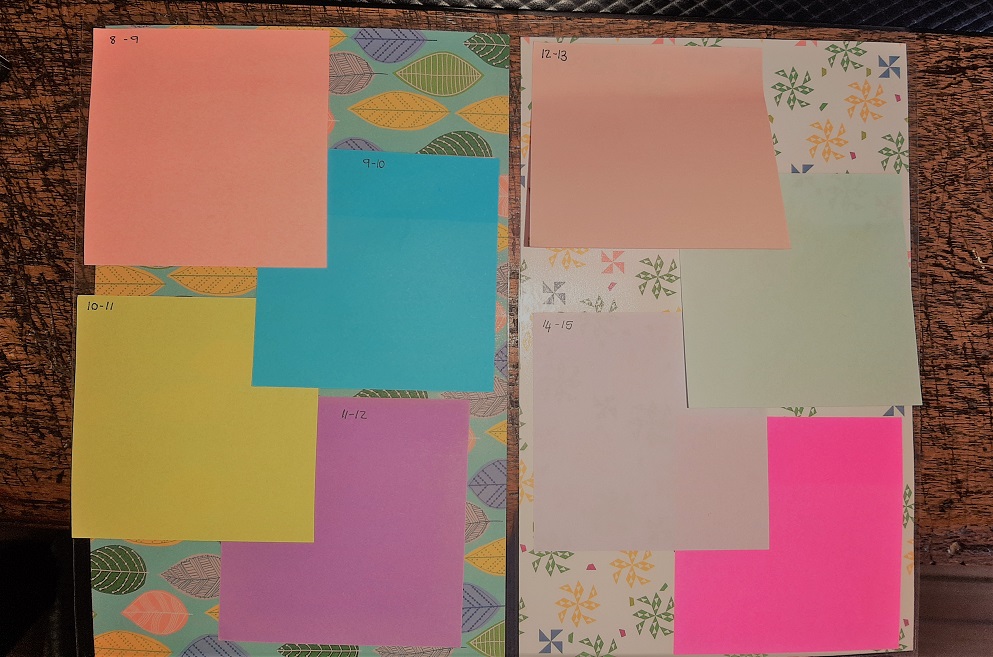
And yes, I know, there are a lot of fancy apps and programs that can do this for you electronically, but I still get a thrill from colouring that little box. There is a lot to be said for a sense of accomplishment, even if it is a small task. This also helps me pinpoint what I am avoiding.
So this lengthy ramble tries to depict how I am trying to fit my eight-hour workday into eight hours. It also helps with the guilt situation, because it shows that I have actually done things on a particular day and it allows me some free time to write about it, like now.

